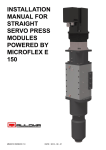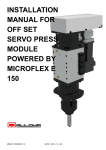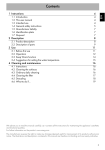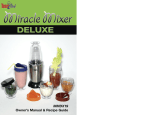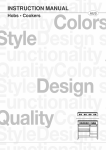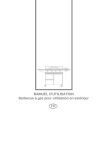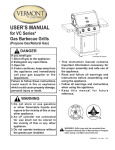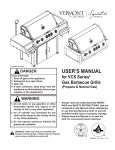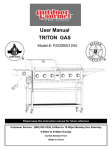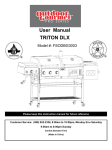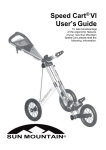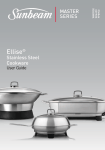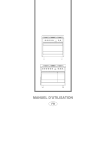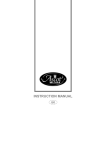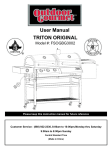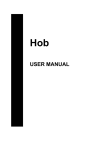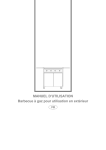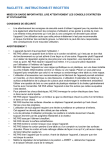Download ZS6250_Steel_UK_gree..
Transcript
INSTRUCTION MANUAL Gas barbecue for outdoor use Thank you for choosing a first class product, which hopefully will provide you with lots of pleasure in the future. Our ambition is to offer a wide variety of quality products that make your life more comfortable. Please take a few minutes to study this manual so that you can take advantage of the benefits of your new machine. We promise that it will provide a superior User Experience delivering Ease-of-Mind. The following symbols are used in this user manual: Important information concerning your personal safety and information on how to avoid damaging the appliance. General information and tips. Environmental information. This appliance complies with: • Low Voltage Dir. 73/23/EEC. • Gas Dir. 90/396/EEC. • EMC Dir. 89/336/EEC. • CE Marking Dir. 93/68/EEC. SQS-COC-100159 FSC Trademark © 1996 Forest Stewardship Council A.C Contents General safety guidelines Gas safety guidelines Proper use Ecological disposal Dimensions Examples of use Preliminary operations Connecting the gas bottle (category II2H3+) A A B B 1 1 2 2 Table of characteristics Check for gas leaks General instructions about gas connection 3 3 3 Description of the barbecue The control panel 4 4 Burner control knob Description of symbols 4 4 Lid Work surfaces Assembling instruction Wheel-mounted bottle trolley Fitting and using the wheels Adjusting the door Adjustment of the drawer height Utensil holder Protection cover Extractable basket Assembling the ceramic tiles kit Positioning the internal components Positioning the grills and griddles correclty Lighting the burners Skewer Cooking tips Meat and Fish Vegetables Pots and pans Brief cooking tips Burner use table Cleaning the barbecue Stainless steel Enamelled cast iron grills and griddle Maintenance of the teak wood Burners Disassembling the burners Drip pan 5 5 5 6 6 6 6 7 7 7 8 8 8 9 10 10 11 11 11 11 11 11 12 12 12 12 12 12 13 General informations This appliance is designed to be used in the home and in the open air. The use in a professional setting or any other use considered improper cause the immediate decline of the guarantee. The appliance meets the conformity requirements of current EC standards. The manual is divided into four sections: Warnings General regulations regarding the safety of operators and correct appliance use. Installation Instructions for the qualified technician in charge of installing, commissioning and testing the appliance. This manual is an integral part of the purchased product. It should be preserved for the product’s entire lifespan. Before using the product, we recommend carefully reading this manual and all the instructions it contains. These instructions are valid solely for the countries the symbols of which are shown on the cover page. The appliance must be installed by qualified personnel in accordance with current regulations. Use Description of controls, switching on the appliance, fitting accessories and cooking tips. Cleaning and Maintenance Recommended cleaning procedures and useful advice for ensuring the appliance continues to work efficiently and look good over time. Warnings A General safety guidelines Gas safety guidelines • Do not leave packing residue unattended around the home. • If you smell gas: shut off the burner flames; close the valve on the LPG bottle or the methane gas tap. If the smell persists, contact your authorised service centre. • Separate out the various waste materials and take them to the nearest recycling centre. • The identification plate, with the technical data, serial number and mark, is clearly visible inside the bottle compartment. The plate must never be removed. • Installation and servicing should be carried out by qualified personnel in accordance with current regulations. • Before operating the appliance it is essential to remove the protective film from the interior and exterior. • Immediately after installation, test the appliance briefly using the directions for use. If it fails to work, contact your nearest technical service centre. Never attempt to repair the appliance. • Always wear protective gloves while handling particularly hot components. • Some accessible parts can become very hot. Keep out of reach of children. • Never use flame to find gas leaks. • The gas pipe should be connected up to standard, and should comply with current regulations that envisage the installation of a safety tap upstream of the gas connection. • This appliance is not fitted with gas safety valves. Do not leave it unattended while it is in operation. should the flames accidentally go out, turn the knobs immediately to OFF and wait a few minutes before attempting to switch on again. • The barbecue can only be used in the open air with natural ventilation, outside of enclosed areas, where any gas leaks and flue gases can disperse rapidly on the wind and with natural air convection. • Do not use the barbecue in enclosed spaces, inside camper vans, caravans or any other mobile installation. • Never use this cooking device to heat rooms. • Never rest inflammable objects on the appliance: this may result in a fire if the appliance is switched on. • This appliance is manufactured to use LPG sold in appropriate bottles at authorised centres. Should it be necessary to use another type of gas (methane) contact your nearest authorised centre. • Always handle empty gas bottles with care and in accordance with the safety regulations provided with the relative instructions. Do not use gas bottles that are dented or rusty. • Do not store spare gas bottles close to the barbecue. • Never disconnect the bottle from the barbecue while it is in operation. Always stand well away from the appliance for any operation to do with the gas bottle. • Only use the unions and regulators supplied with the appliance to connect to the bottle. • After the appliance has been unused for a time, always check the gas is correctly connected before switching on again (see section “Check for gas leaks” on page 3) and check that the gas outlet holes are not clogged with dust or the like (see section "Burners" on page 12). B Warnings Proper use Ecological disposal • The appliance is designed to be used by adults only. Do not allow children to approach the appliance or use it as a toy. • The product packing is made of non-polluting, environment friendly and recyclable materials. Dispose of the packing correctly at recycling and disposal centres. • Never leave the appliance unattended during use. • The pans and containers used on the grills must have a perfectly flat, smooth bottom. • Do not use containers that protrude over the outer perimeter of the surface. • Switch on the burners only when the lid is lifted. • Before the barbecue is first used for cooking, the burners should be left on for 10 minutes (with the lid up) to burn off all manufacturing residue and oil. • Always open the lid before switching on the barbecue. Never close the lid before the barbecue has cooled down. • The barbecue becomes very hot during use. To avoid being scolded, it is advisable to wear heat protection gloves. Do not touch the heating elements inside the appliance. • After each use, always check that the control knobs are set to OFF. • Do not use the barbecue in bad weather. Contact with water can severely damage the appliance and endanger its safety. • Do not obstruct the vents of the appliance. • To prevent the combustion of previous cooking residue, clean the drip pan, burners compartment and the burners themselves before each use. • Do not use metal sponges or sharp scrapers on the external surfaces. Use normal non-abrasive products, with wooden or plastic utensils if necessary. Rinse thoroughly and dry with a soft cloth. Do not use high pressure water jets on the barbecue, the power of the water jet may damage the finish and endanger safety. • If you foresee to let your barbecue unused for a long period, make sure it is appropriately cleaned, see the chapter about “Cleaning the barbecue” at page 12; put on the protection cover and place the appliance in a sheltered location. The manufacturer declines all responsibility for use other than that indicated, as well as for damage to things or harm to persons caused by failure to comply with these guidelines or by tampering, even partially, with the appliance or by the use of non-original spare parts. Installation 1 Dimensions Version with trolley and side shelves 9 : MODEL NO. BURNERS X Y I9C-4 4 1600 975 I7C-2 2 1300 850 Examples of use The outdoor area in which the barbecue is positioned must meet the following requirements: 1. there may be walls on all sides, but there must be at least one permanent doorway and no ceiling; 2. there may be no more than two side walls when there is a ceiling; 3. there may be partial overhead cover, including a ceiling, but with no more than two walls and with the following conditions: a) At least 25% of the total wall surface is completely open. b) At least 30% of the remaining surface is open and not delimited. If positioning on a balcony or terrace, at least 20% of the total wall surface must be open. 3a 1 2 3 3b 2 Installation clamps supplied as described below. Preliminary operations The barbecue has been designed and built to cook and heat food in the open air. This appliance is not designed for use in a professional setting or in enclosed spaces. Before installing and using the barbecue, the interior should be cleaned of any manufacturing residue. For further information on cleaning refer to chapter "Cleaning the barbecue" on page 12. Choose the installation site for the barbecue carefully: 1. it must not be too dusty: long term dust may clog the burners and make using the barbecue hazardous; 2. it must not be too exposed to the wind: during use strong winds may prevent the barbecue from working properly or accidentally switch off the burners; 3. position the barbecue so that it is completely stable; 4. away from inflammable materials. • Remove the lower rear panel “F”: pull it up and ahead. • Remove the upper rear panel “G”: pull it up and ahead. • Provide a gas pipe of 800 mm length. You may need a pipe holder “H” on the end of the ramp “E”. • Connect the end “A” of the gas pipe directly to the ramp “E” or to the pipe holder “H”. • Connect the end “I” of the gas pipe to the pressure regulator “C”. • Connect the gas pressure regulator “C” to the threaded union “B” on the bottle. • When the gas bottle is inside the chart make the gas tube going trough the hole “D” then connect. • Fit the rear panels “G” and “F” putting in position then pulling down. The symbols in the picture mean that on those points a clamp could be necessary. After connecting, ensure the rubber pipe is not crushed, hanging or obstructing the hole in the lid. Contact your nearest authorised service centre to connect the barbecue to a methane supply (G20 at 20 mbar). Before installing and using the barbecue remove all plastic protections from the control panel and from the stainless steel sides of the appliance. Refer to current regulations to fit or replace the rubber pipe. The pipe's expiry date is printed on the pipe itself. Ensure the pipe is replaced before this date. Connecting the gas bottle (category II2H3+) Should the gas bottle not be fitted with a stop valve, a shut-off tap should be used. The tap must be easily accessible. Do not obstruct the vents in the bottle compartment. The gas bottle must be replaced away from any power source. The appliance is already regulated to operate with LPG (G30/31 at 28-30/37mbar). Simply connect the rubber pipe using the seals and C I A H E B G F D Installation 3 Table of characteristics BURNERS GRILL Rated power kW 6.20 Reduced power kW 2.20 m3/h 0.590 g/h 450.82 CONSUMPTION G20 20mbar G30 28..30mbar NOZZLE DIAMETER G30 28..30mbar G31 37mbar n° 127 G30 50mbar G31 50mbar n° 110 G20 20mbar n° 190 G25 25mbar n° 200 G25 20mbar n° 220 BY-PASS DIAMETER G30 28..30mbar G31 37mbar n° Reg. G30 50mbar G31 50mbar n° Reg. G20 20mbar mm Reg. G25 25mbar mm Reg. G25 20mbar mm Reg. Check for gas leaks This check should be carried out immediately after connecting the gas and each time the appliance is reconnected after being unused for a time. Once the rubber pipe is connected to the gas supply, carry out the following operations: 1. Open the gas valve on the LPG bottle (or turn the shut-off tap if methane supplied). Do not light the burners yet. 2. With the gas pressure in the pipe, look for any leaks by brushing a soapy water-based solution onto the gas unions. A gas leak will cause bubbles to form. Do not use naked flame to look for leaks. 3. Close the gas valve on the bottle (or the methane shut-off tap), eliminate the gas leak and repeat the test as described in points 1 and 2. General instructions about gas connection We recommend checking that the appliance is properly set up for the type of gas 1/2” distributed. The connection to the gas pipes must be made in a workmanlike manner, in compliance with current standards that prescribe the installation of a safety tap at the end of the pipe. The threaded ½" gas connection pipe is located at the rear on the right hand side of the appliance. Using flexible rubber pipes with a max. length of 1500 mm: • do not allow the pipes to be constricted or crushed; • pipes must not be subject to tractive force or torsional stress; • do not allow the pipes to come into contact with cutting or sharp edges, etc... • do not allow the pipes to come into contact with parts that can reach temperatures of 70°C above room temperature; • make sure the entire length of the pipes can be inspected. 4 Installation Description of the barbecue A B C D E F G H I L M Side work surface Drip pan Exhaust vents Enamelled cast iron grills Griddle A Drawer Gas bottle compartment door Control knobs Wheel with brake Wheel without brake Lid M E C B B F G I L D H The control panel 1 Left burner control knob 2 Centre left burner control knob 3 Centre right burner control knob 4 Right burner control knob All the barbecue's controls are fitted on the front panel. 1 2 Burner control knob To switch on the burner refer to section "Lighting the burners" on page 10. 3 4 Description of symbols Piezoelectric ignition Maximum flame Minimum flame Burner off Installation Lid Assembling instruction 1. Insert the washer “A” into the pins “B”. 2. Insert the pins “B” into the holes “C”. 3. Fix the screws “D” to the pins “B”. 4. Fix the supports “E” to the washers “F” and the screws “G” to the pins “H”. 5. Insert the pins “I” into the holes “L”. 6. Insert the sides “P” into their own pins. 7. Fix the sides supports to the rear wooden by turning the hooks “M”. P D C Always open the lid before switching on the barbecue. Never close the lid before the barbecue has cooled down. P A B The lid becomes hot while cooking. To prevent from damaging the lid and wooden sides: Opening: • Pull up the lid and let it slide to the rear; when in vertical position leave it on the rubbers. Closing: • Pull up the lid to the front side and leave it only when it is completely out. M Work surfaces I L H G The Work surfaces are designed to withstand a maximum weight of 10 Kg. P E P F TEAK work surface. It is fastened to the barbecue structure. 5 6 Installation Wheel-mounted bottle trolley Adjusting the door Made of stainless steel 18/10. Fitted with two fixed wheels and two pivot wheels with brake. Designed to contain the gas bottle, but can also be fitted with drawers or additional cupboards depending on the width. Bottles up to 50 cm tall (including the fitted pressure regulator) can be stood under the trolley surface. It is advisable to fit the pressure regulator outlet horizontally. The hinge on the door can be adjusted by turning the screws indicated by the arrows in the adjacent diagram. A +2 + 2,8 mm B -2 The drawers are designed to withstand a maximum weight of 25 kg. Do not rest inflammable objects (such as paper, cloth and other materials) inside the drawers or inside the bottle compartment. C Fitting and using the wheels The wheels provided with brakes must be fit on the left of the appliance, while the other wheels must be fit on the right side. To fix the brackets of the barbecue simply press a foot onto the snap lever as shown in the figure. To release the brackets, return the lever to standby position. Adjust the door once installation is complete. Adjustment of the drawer height The clips of height adjustment are located in the lower side and at the right and left ends of the drawer. LEFT RIGHT Do not use the trolley unless the wheels are correctly screwed in. + 3 mm max A • By turning the lever “A” the drawer will raise of 3 mm. Installation Utensil holder Extractable basket The utensil holder is a steel frame for storing utensils and tools inside the gas bottle compartment. The 70 cm version is equipped with an extractable basket. A B A B When fully open, the basket can withstand up to 15 Kg. Do not exceed this limit to avoid damaging the basket. To fit the holder, proceed as follows: • open the door of the gas bottle compartment; • place the frame onto the 4 fastening pins “A” already secured to the inside of the door; • push the frame downwards until the pins fit into the slots “B”. To remove the frame, lift upwards then away from the pins. Protection cover PVC waterproof plastic material, to be used for covering and housing in the open air the barbecue in the trolley version. To clean use water and neutral detergent. 7 8 Use Assembling the ceramic tiles kit A F D B C D F F D E F D 1. Remove the grill grates "A", griddles "B" and disperser "C" (one per kit to be installed). 2. Place the two side supports "D" and the central support "E" (for double kit only) in the combustion chamber. 3. Position the crosspieces "F" in the slots made in supports "D" and "E". 4. Rest the tiles on the frame as shown in the figure. 5. Replace the grill grates "A" and griddles "B". Positioning the internal components Before beginning to cook, check the burners, dispersers, deflectors, grills and griddle are correctly in place. • The figure shows the correct sequence for positioning the burners “A”, dispersers “B”, deflectors “G”, grills “C”, the grids “D” and the ceramic tiles frame “F”. • The tabs on the dispersers “B” should be inserted into the slots “E” on the inside of the barbecue. D E C B The disperser "C" (one per kit) is not replaced, as it would not fit with the tiles assembled. A To assure a good working, take care that the ceramic tiles holes get not obstructed. Overturn the tiles regularly to let the burners carbonate the cooking residuals. F G Only in the conditions illustrated above, with all the aforesaid components correctly assembled, is it advisable to start cooking. Any other set-up may constitute a risk for the user and may jeopardise the good use of the appliance. Use Positioning the grills and griddles correclty To ensure the best grill result it is important to select the most appropriate griddles for the type of food to be cooked. Below are some hints listed. Open griddle Closed griddle, ribbed side Closed griddle, flat side Fillet steaks Fish Shrimps Chicken legs Vegetables Sausages Cheese Fruit Hamburgers Vegetables Cheese Fried eggs Bacon The open griddles can be used on both sides. The closed griddles are double-faced: smooth on one side, striped on the other side, in order to allow different kinds of cooking. Never put the two griddles side by side. For a correct positioning and use please refer to the below diagram. 9 10 Use Lighting the burners Skewer Each knob indicates the corresponding burner (see "The control panel" on page 4). The barbecue is provided with a skewer. Position it over the grill as shown in the picture. A Skewer handle. B Skewer. C Skewer housing holes. D Front skewer support. E Griddles. F Grills. 1. Press the knob and turn the indicator to the symbol : the ignition clicks and the pilot light switches on simultaneously. To generate other discharges, hold down the knob while turning the indicator repeatedly to the symbol . 2. Once the burner is lit, turn the indicator to position . Release the knob: the burner is now on the maximum setting. 3. To adjust from maximum to minimum setting, turn the knob from to . 4. To switch off the burner return the indicator to ; press the knob and turn the indicator to (burner off) while holding down the knob. Release the knob. E C B F A D 1 2 3 4 If the burner does not light, return the knob to ; press the knob and turn the indicator to (burner off) while holding down the knob. Wait a few seconds to allow the gas emitted to disperse and then repeat points 1 to 3. To check the burners have turned on, look for the flame through the slots in the grills. ENSURE THE DRIPPING PAN IS CORRECTLY INSERTED BEFORE STARTING TO COOK FOOD. IT IS ADVISABLE TO POUR A THIN LAYER OF SAND INTO THE DRIPPING PAN TO SOAK UP COOKING JUICES, THUS PREVENTING COMBUSTION AND ALSO TO ENSURE THE COMPONENTS BENEATH REMAIN CLEAN. REPLACE OLD SAND AT REGULAR INTERVALS WITH CLEAN SAND TO PREVENT THE RISK OF FIRE DUE TO A BUILD-UP OF COOKING JUICES. Use 11 Cooking tips Some suggestions for getting the best out of your barbecue are given below. Please remember that cooking times and intensities may vary according to personal taste and type of food. Never close the lid on this appliance while cooking! Meat and Fish To cook meat, preheat the grill burners on maximum setting for at least 5-10 minutes, depending on the thickness of the meat. For small pieces (chops, bacon rashers, ribs etc.) preheat for a short time (approximately 5 minutes). For bigger cuts, preheat for longer (approximately 10 minutes). In general, to cook meat, the burners should be set on maximum, and on medium/minimum for fish and vegetables. For best results, scald the food first on maximum. Then adjust the burners to medium/minimum until the food is cooked through without burning on the outside. While cooking, particularly pork, it is normal for the flame to flare up due to fat dripping on to the refractory ceramic tiles. If this occurs move the food to a cooler area of the grill. Completely filling the grill with food is not therefore recommended. For steaks and fillets the open griddle, placed over the ceramic heat deflectors, gives the best result, while for fattier meat, such as chicken legs TEMPERATURE 230 - 250 °C BURNER SETTING Maximum setting ( and sausages, it is recommended to use the closed griddle plates to avoid fat dripping onto the burners, which causes flare ups. Meat and fish should only be turned over once, while sausages can be turned regularly to seal the surface and cook them through evenly. Vegetables To cook vegetables preheat as mentioned before. After preheating adjust the burners to minimum and arrange the vegetables on the grill. Keep the burners on minimum for the duration and cook on the closed griddle plates to protect delicate food. Pots and pans The flat sided griddle plate can also be used as a stove on which rice, pasta and sauces can be prepared in pans. Brief cooking tips • Always preheat with the burners on maximum. • 15-minute preheat recommended when cooking on the griddle. 15-minute preheat recommended when more marked grilling is required. USE ) High heat. Preheating before cooking begins. 200 °C Medium-maximum setting Medium-high heat. For cooking of thin cuts of meat, fish and vegetables. 160-180 °C Intermediate setting Medium heat. For cooking medium cuts of meat (medium-size chicken, devilled chicken, etc.). 150 °C Medium-minimum setting Medium-low heat. For smoking, for heating food or keeping just cooked food warm. 110-120 °C Minimum setting ( ) Low heat. For grilling vegetables; for keeping just cooked food warm. 12 Cleaning and Maintenance Cleaning the barbecue For optimum cleaning in accordance with manufacturing characteristics, use products that are not excessively aggressive. To clean the metal internal parts, we recommend wearing work gloves. Stainless steel After each use, and when the appliance has cooled down, we recommend cleaning the external and internal parts and the stainless steel accessories to help the barbecue last longer. To clean and preserve the external stainless steel surfaces, always use specific products without abrasives or chlorinebased acids. Do not use metal sponges or sharp scrapers. Use wooden or plastic utensils if necessary. Continual contact with the flame may over time fade the shine on the steel near the areas exposed to heat. This is entirely natural and does not alter the performance of the appliance in any way. Using detergent: spray the detergent repeatedly on the steel surfaces of the barbecue. Clean with a non-abrasive sponge, rinse carefully and dry with a soft cloth. For best results, leave the detergent to work for a time. To remove any yellow areas on the steel, pour some stainless cream cleaner onto kitchen paper and rub in the direction of the satin finish. Enamelled cast iron grills and griddle A B C After thorough cleaning and before using the cast iron grills and griddles again, remove any detergent residue by lighting the burners on maximum for a few minutes. Maintenance of the teak wood To clean and preserve always use specific products normally available on the market and which may ensure the lasting all over the years. In case those products are not available we recommend to remove the grease as soon as possible by using a soft cloth dampened with water. Burners Periodically check that the burners light properly and that no gas outlet holes are clogged. If a burner does not light fully, it may be sufficient to use compressed air to clear the holes clogged with dust or the like. If this is not effective, disassemble the burners and clean them thoroughly (e.g. putting a pin through the clogged holes and blowing compressed air straight into the burner). Disassembling the burners • Remove the grills “A” and the griddles “B”. • Remove the dispersers “C”. • Estract the tiles frame “G”. • To remove the burners “D” remove the cotter pins “F” (one per burner); then free the Venturi tube from its seat and take out. • Remove the deflectors “E”. • Clean the barbecue vessel with stainless steel detergent. Rinse and dry. • Carefully clean the individual components and refit them with the above procedure in reverse order. B A C The cast iron grills “A” and griddles “B” should be cleaned when still slightly warm. To clean the griddles “B” use the supplied scraper “C”. To remove any food residue, rub with a brass bristle brush. Then wash the grills and griddle with a degreasing agent and rinse with plenty of tepid water. The cast iron grills and the griddles are also dishwasher safe. D G E F Cleaning and Maintenance 13 Drip pan After cooking (after the barbecue has cooled down): The oily residue resulting from cooking meat and fish should not be thrown away in the home, but disposed of correctly in special bins or delivered to recycling centres. 1. open the bottle compartmet door 2. open the drawer 3. remove the drip pan as shown in the figure and pour the oily residue into a closable container so that it can be disposed of correctly. • Clean up the grease tray and insert it back in its own housing opening first the drawer and the compartment door. 3 2 1 UK B00090 ZS6250 03/12






















